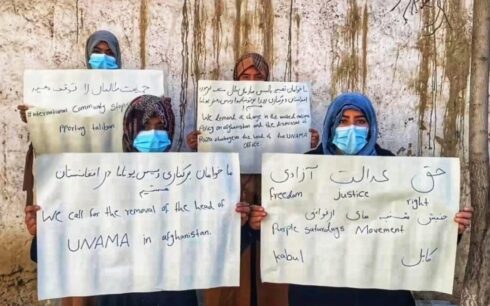A woman from Balkh province has recounted her ordeal in a Taliban court after filing for a divorce from her abusive husband and said the judge told him “to take her eyes out” if she complained.
Twenty-one-year-old Hina said her experience had been extremely unpleasant and that she had received no support from court officials, which was contrary to what she had been led to believe.
She said her husband, who she had been forced to marry, and his family had been abusive to her.
“Taliban told my husband to take your wife home and punch her in the face. The judge said: take her eyes out if she says anything,” Hina said.
According to her, other women who have filed for divorce have received the same treatment.
Hina had been in Grade 10 when the former government collapsed and the Taliban regained control of the country. As a result of the political changes, she was forced to marry a Taliban member.
“I lost my baby due to being beaten by my husband and his brother while I was pregnant,” Hina said, adding that when she had been with her husband, she had been banned from visiting her family.
She is now back with her parents and filed for a divorce six months ago. Her husband lives in the Dawlat Abad district in Balkh province.
According to her, she is verbally abused by officials every time she goes to the Taliban court. In one instance, Taliban court officials threw her documents away, she said.
“Taliban told my father in the court to go and sell your daughter, idiot,” she added.
“I was not allowed to speak in the court,” she said.
After the fall of the previous government, women in the legal profession, including lawyers, prosecutors and judges, lost their jobs. In addition, organizations that protected women and lobbied for their rights, including the ministry of women’s affairs, were disbanded.
Sweeta, another young woman in Balkh province, said she has a heritage claim, which was referred to a Taliban court. She said her husband had been in the security forces under the previous government and had been killed in action. She said she is fighting for her husband’s property.
The young widow, who has four children, is determined to get what is due to her and visits the Taliban court in Balkh every day.
She said that she had not been allowed to speak during her hearings and the judge said she had to live with her husband’s family – or she must “marry a mujahid (a Taliban member).”
Court rulings in favor of men
Women who have dealt with Taliban court systems all said they have been treated “harshly” by Taliban officials and that the rulings have not been in their favor.
One source, who works at a Taliban court, said that rulings had not been made in cases of violence against women and divorce cases in Balkh. He also said when women complainants try to find out about the progress of their cases, they are told “idiot, you are a woman and you speak like this.”
Ahmadullah Balkhi, a defense attorney who handled family cases in Balkh court during the previous government’s tenure, said nothing has been carried over from the previous legal system and there are no family courts for women right now.
“The civil department that handled cases such as money dealing issues, property deals, land ownership and so on, were also handling family cases. But now if a woman wants to file for divorce in a primary court, not even her letter is accepted,” he said.
Another defense attorney said on condition of anonymity that there is a severe lack of attention given to women’s cases in the courts and judicial organizations under Taliban rule.
This treatment, he said, has limited women’s access to justice, and in many cases when a woman is involved, the judge rules in favor of the man.
He said no defense attorney is allowed to handle a woman’s case, and if he does, he has to explain to the Taliban why he did so.
This comes as UN experts said in a report this week that legal professionals in Afghanistan are at risk and their situation is concerning. The experts said women have been removed from Afghanistan’s legal system over the past 18 months under Taliban rule.





